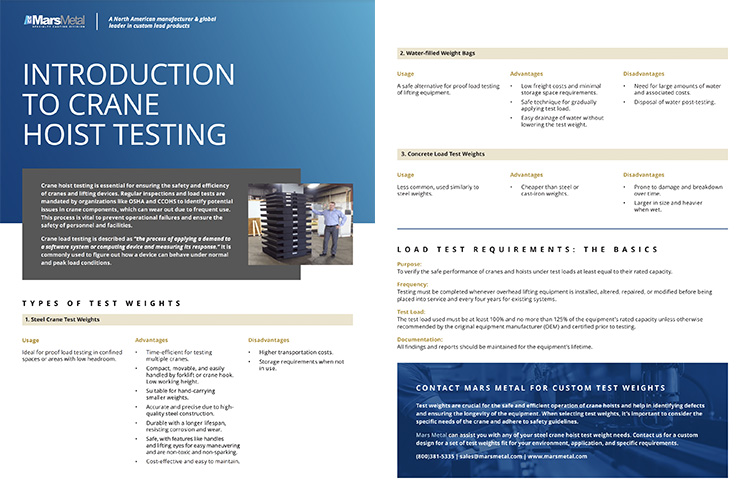Mars Metal's Introduction to Crane Hoist Testing
November 27, 2023
A recent addition to the MarsMetal site explores the vital importance of crane hoist testing, focusing on ensuring safety and efficiency in crane operations. The resource discusses various test weight types, their pros and cons, load test requirements, and the significance of proper weight selection. It emphasizes Mars Metal's capability to craft tailor-made test weights, reflecting the company's commitment to crane safety and operational excellence. The new resource enriches the understanding of crane hoist testing and showcases MarsMetal's expertise in this field.
Crane Hoist Testing Best Practices
Ensuring the safety and optimal functionality of cranes and lifting equipment is an indispensable aspect of operations. Mandated by leading safety organizations such as OSHA and CCOHS, routine crane hoist testing and inspections are imperative. These assessments aim to pinpoint potential wear and tear in crane components, a natural consequence of frequent use, significantly reducing the risk of operational breakdowns. Described as a process analogous to gauging a software system's response to demands, crane load testing is pivotal in comprehending how these devices perform under varying load conditions, both regular and at peak capacity.
Diverse Test Weight Variants
1. Steel Crane Test Weights
- Ideal for confined spaces or areas with limited headroom.
- Boasting high-quality steel construction, these weights ensure accuracy, durability, and safety.
- However, they may entail higher transportation and storage costs.
2. Water-filled Weight Bags
- Offer a safer alternative for load testing with minimal storage needs.
- Efficient in gradually applying test loads and easy drainage post-testing.
- Yet, they require significant water quantities and entail disposal costs.
3. Concrete Load Test Weights
- Less common but a budget-friendly option compared to steel or cast-iron weights.
- Susceptible to damage over time and bulkier when wet.
Critical Load Test Requirements
- Purpose: To verify crane and hoist performance under loads equal to or within the rated capacity.
- Frequency: Mandatory during installation, repairs, and every four years for existing systems.
- Test Load: Generally set between 100% to 125% of equipment's rated capacity, subject to manufacturer recommendations.
- Documentation: Maintenance of all findings and reports for the equipment's lifespan is imperative.
Engaging Mars Metal's Expertise
Understanding the pivotal role of test weights in ensuring crane safety and operational efficiency, AECinfo.com underscores the importance of selecting the right test weights. Mars Metal stands ready to assist in designing custom test weights tailored to specific crane requisites, aligning with safety protocols and environmental needs. For bespoke test weight solutions, Mars Metal offers a spectrum of steel crane hoist test weight options.
Read the original article on MarsMetal's site >
@MarsMetalCo #MarsMetal #leadcasting #leadfabrication #leadfinishing
Company:  MarsMetal
MarsMetal
Product: Test Weights
Source: https://marsmetal.com/wp-content/uploads/2023/11/1799826_MarsMetal-BlogPDFDesign_111723-1.pdf
Tags:
Concrete
Specialty floors for food & beverage environments withstand high temperatures and forced steam cleaning (October 19, 2023), Introducing the REFLECTOR™ Enhancer Flooring Systems for Architects (August 25, 2023), Introducing Stromberg GFRC: The Future of Reinforced Concrete (August 10, 2023), Sydney Metro’s Central Walk Relies On Penetron Technology For Durability (August 1, 2023), 3 Retail Flooring Options (May 30, 2023), Admix C-Series: improving concrete performance right from the start (May 25, 2023), Level-Right® floor underlayment: the rock-solid solution for uneven floors (April 27, 2023), Concrete surface restoration (February 23, 2023), Stainless Steel Waterstop can stop even the most corrosive fluids in their tracks (December 14, 2022), Electrostatic Dissipative Flooring - Before & After (November 2, 2022)
OSHA
What rooftop safety solutions can help you achieve total compliance? (November 9, 2022), Safeguarding the Health of Building Occupants (April 25, 2022), Fall Protection Railing Systems (April 1, 2022), Fall protection railings for metal standing-seam roofs (November 1, 2021), Accu-Fit Guardrails provide OSHA-compliant fall protection and distinctive design (August 16, 2021), SafetyRail 2000 Roof Fall Protection Guardrail System (August 11, 2018)
Safety
Steel
Transform Your Space with Coco Architectural Grilles & Metalcraft Linear Bar Grilles (July 21, 2023), Enhancing Sound Control: The Versatility of Ambico's Acoustic Door & Frame Assemblies (July 12, 2023), Industrial Wheel Maintenance and Selection - Keep industrial steel wheels in their best working condition (March 17, 2023)


